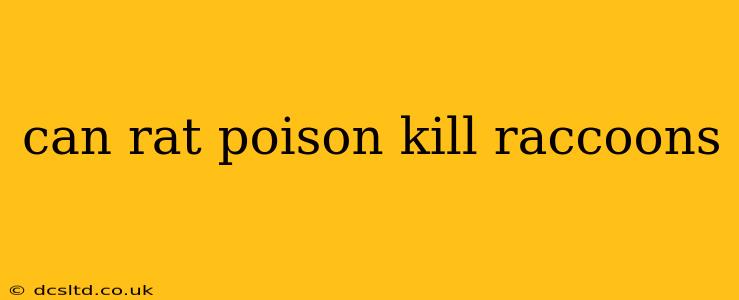Can Rat Poison Kill Raccoons? The Risks and Responsibilities of Raccoon Control
The question of whether rat poison can kill raccoons is a complex one, with significant ethical and practical considerations. While certain rodenticides can be lethal to raccoons, using them to control raccoon populations is generally not recommended and often illegal without proper licensing and expertise. This is due to several factors, which we'll explore in detail below.
What types of rat poison are dangerous to raccoons?
Many anticoagulant rodenticides, designed to prevent blood clotting in rats and mice, are also toxic to raccoons and other wildlife. These poisons can cause internal bleeding, leading to a slow and painful death. The effects can be delayed, meaning a raccoon might wander off and die unseen, potentially creating a secondary hazard (e.g., attracting scavengers or contaminating the environment).
Are there safer alternatives to poison for raccoon control?
Absolutely. Poisoning is a crude and often inhumane method of dealing with raccoons. More humane and effective methods exist, and should always be prioritized. These include:
- Exclusion: This involves identifying and sealing entry points to your property, preventing raccoons from accessing areas where they're causing problems (e.g., attics, sheds). This is often the most effective long-term solution.
- Trapping and Relocation: Licensed wildlife professionals can trap raccoons humanely and relocate them to a suitable habitat away from human dwellings. This is a much more ethical approach than poisoning.
- Deterrents: Various deterrents can discourage raccoons from entering your property. These include noise-making devices, bright lights, and strong-smelling repellents. However, their effectiveness can vary.
- Removing attractants: Raccoons are attracted to readily available food sources. Secure garbage cans, compost bins, and pet food to eliminate attractants.
What are the legal implications of using rat poison to kill raccoons?
In many areas, using rodenticides to control wildlife, including raccoons, is strictly regulated or even prohibited without the proper licenses and permits. Improper use can result in hefty fines or legal penalties. Always check your local regulations before attempting any wildlife control measures.
What are the environmental consequences of using rat poison?
Raccoons are part of the ecosystem. Their removal through poisoning can disrupt the delicate balance of nature. Furthermore, the poison itself can contaminate soil and water, posing risks to other animals and even humans. Secondary poisoning, where other animals consume poisoned raccoons, is a serious concern.
What should I do if I find a raccoon that has ingested rat poison?
If you suspect a raccoon has ingested rat poison, do not attempt to handle it yourself. Contact your local animal control or wildlife rehabilitation center immediately. They have the expertise and equipment to safely assess the situation and provide appropriate care.
Is it ethical to use rat poison to kill raccoons?
The ethical considerations surrounding the use of rat poison to kill raccoons are significant. Poisoning is often a slow and painful death, causing unnecessary suffering. Humane and ethical alternatives are always preferable, prioritizing the well-being of the animal and the environment.
In conclusion, while rat poison can kill raccoons, it is generally not recommended or legal due to the ethical, legal, and environmental implications. Always prioritize humane and effective alternatives for raccoon control, focusing on exclusion, trapping and relocation, and deterrence. Consulting with wildlife professionals is crucial for safe and responsible management of raccoon populations.
